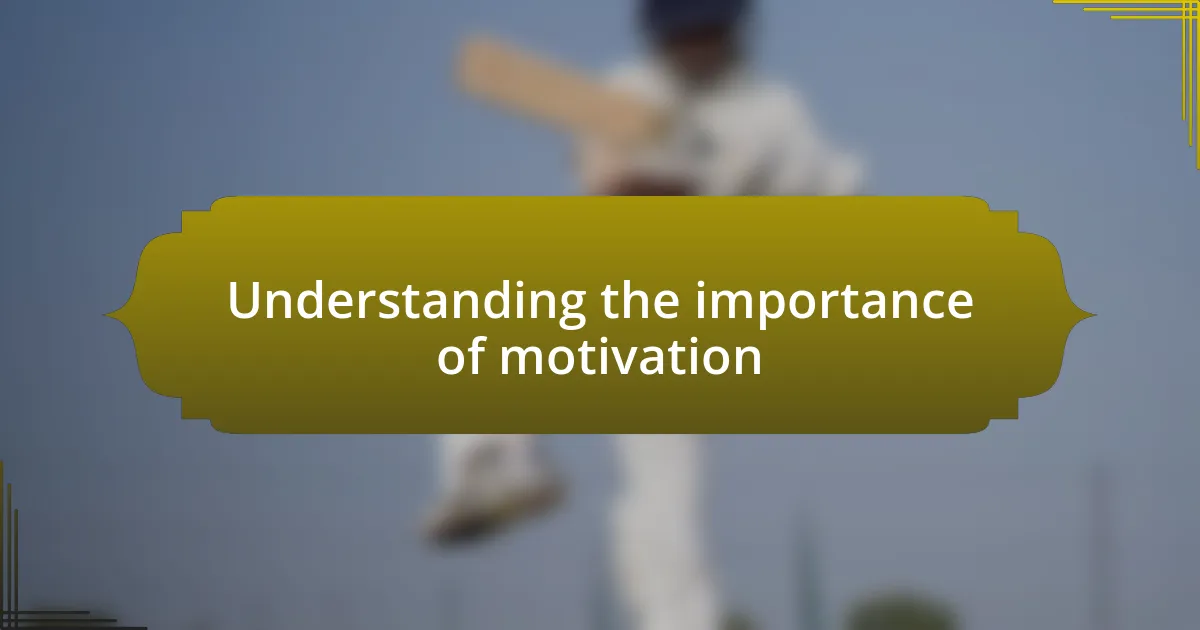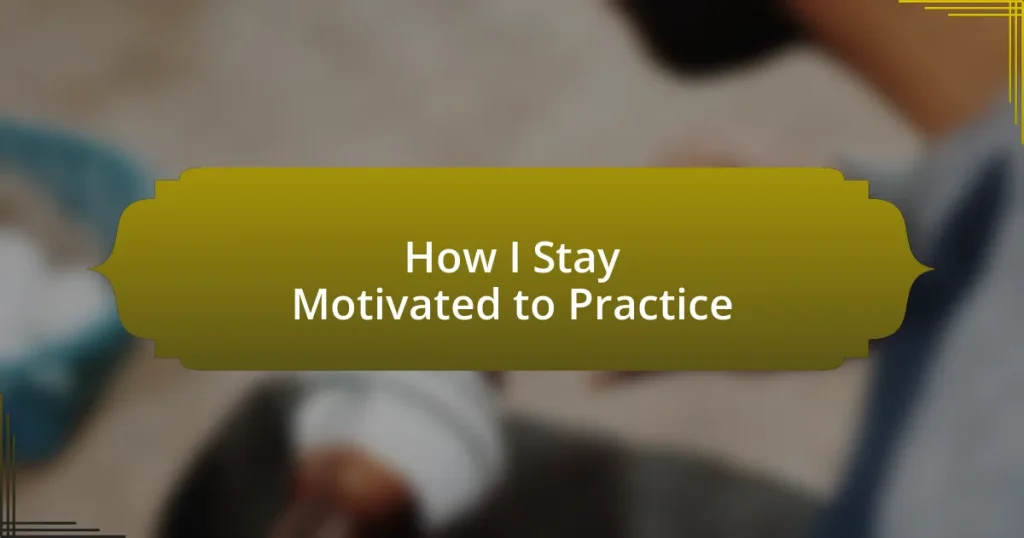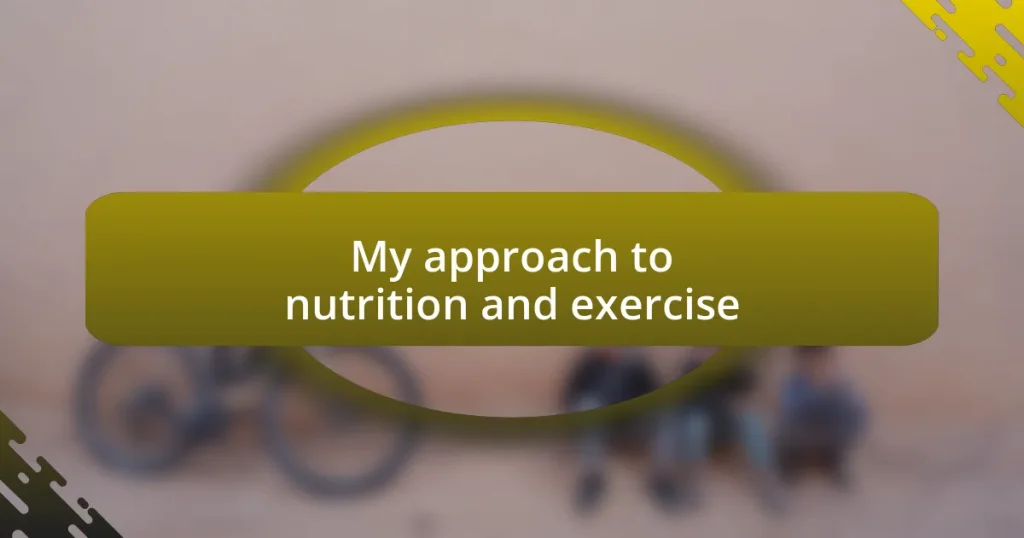Key takeaways:
- Motivation is essential for transforming practice into a fulfilling journey and can be fostered by setting clear personal goals.
- Developing a consistent yet flexible practice routine enhances accountability and helps maintain motivation amid life changes.
- Incorporating rewards for achieving milestones boosts morale and reinforces positive habits in practice.
- Tracking progress through journals or apps provides tangible evidence of growth and serves as a motivational tool.

Understanding the importance of motivation
Motivation is the fuel that ignites our passion to practice consistently. I remember days when I lacked drive; every session felt like a chore rather than a joy. That stark contrast helped me understand just how crucial motivation is in transforming practice from a mundane task into a fulfilling journey.
Without motivation, it’s easy to become stagnant, right? I’ve experienced this firsthand—it’s disheartening when progress stalls. It’s during those low moments that I’ve learned the importance of setting clear, personal goals. These goals become my lighthouse, guiding me even when the waters are rough.
Have you ever noticed how motivation shifts with our emotional states? For me, a simple compliment or a small achievement can reignite my enthusiasm. This realization reminds me that cultivating an environment of encouragement is vital, not just for myself but for others who share similar journeys.

Setting clear practice goals
Setting clear practice goals has been a game changer for me. When I define what I want to achieve, it brings focus and clarity to my practice sessions. For example, I remember when I decided to learn a new song. Instead of aiming to just “get better,” I broke it down into smaller, measurable steps like mastering the chords first, then working on transitions, and finally, putting the whole piece together. This approach transformed my practice from an overwhelming task into a series of achievable milestones.
Here are some tips for setting effective practice goals:
– Be specific: Instead of saying “I want to improve,” identify what that means for you.
– Make them measurable: Setting a timeframe or quantifying your goals can help you track your progress.
– Align with your passion: Focus on what excites you; this fuels motivation.
– Adjust as needed: Be flexible and willing to modify your goals if they become unrealistic.
– Celebrate small wins: Acknowledging progress, no matter how minor, keeps the momentum going.

Developing a consistent routine
Developing a consistent routine has been essential in maintaining my motivation to practice. I recall the days when I would randomly pick up my instrument without a plan, leading to scattered results and frustration. By choosing specific times for practice each day, my sessions became a natural part of my schedule. For instance, I’ve found that early mornings work best for me, as I feel refreshed and ready to tackle new challenges without distractions.
While following a routine is crucial, I also recognize the importance of keeping it flexible. There are times when life gets in the way, and I have to adapt. For example, I might shift my practice to the evening if my mornings are busy. This adaptability ensures that I don’t lose motivation even when life throws unexpected changes my way. Staying committed to my practice is about finding a rhythm that works for me but also being open to change when necessary.
I often incorporate rewarding elements into my routine to keep me engaged. For instance, after a week of consistent practice, I treat myself to something small, like a coffee from my favorite café. This simple act boosts my morale and reinforces the idea that my hard work is worthwhile. Over time, I’ve come to understand that a consistent routine, combined with the flexibility to adjust and rewarding myself, creates an environment where I can thrive in my practice.
| Routine Strengths | Routine Challenges |
|---|---|
| Creates structure and focus | Can feel restrictive sometimes |
| Enhances accountability | May lead to burnout if too rigid |
| Facilitates progress tracking | Adaptation needed for life changes |

Using rewards to boost practice
Using rewards has truly been a game-changer for me in maintaining my practice routine. I’ve noticed that when I set small milestones, celebrating them with a little treat keeps my motivation high. For example, after mastering a challenging piece, I might indulge in my favorite dessert or buy that new music book I’ve been eyeing. These little rewards not only feel like a pat on my back but also make the effort worthwhile.
I often ask myself how I can make my practices feel more satisfying. Once, after a particularly long week of practice, I decided to reward myself with a mini movie marathon featuring my favorite films. It felt amazing to unwind and reflect on how far I had come while also recharging my creative energy. This balance of effort and reward invigorates my spirit and keeps me coming back to my instrument with renewed enthusiasm.
Incorporating rewards into my practice isn’t just about indulgence; it’s about reinforcing positive habits. I remember a time when I was struggling to stay focused. By attaching small rewards to each practice session, like a quick walk outside or a few minutes of reading, I transformed my mindset. Each reward acted like a little boost, reminding me that my dedication would lead to enjoyable moments, both during practice and afterwards. How about you? What little rewards could elevate your own practice experience?

Finding inspiration from others
Finding inspiration from others has been incredibly meaningful in my journey. I recall attending a concert where the performer shared their struggles with practice and how they overcame them. Hearing their story made it clear that every musician faces challenges, and it sparked a fire in me—if they could push through, so could I.
I’ve also sought out mentorships or online communities where musicians share their experiences. Just last month, I connected with a fellow musician who has been on a similar path. Their contagious passion and dedication reminded me that I’m not alone on this journey, and it gave me the encouragement I needed to tackle those harder pieces that I had been avoiding.
Sometimes, I find that simply watching tutorials or performances can ignite a sense of motivation within me. I often ask myself, which artist has inspired me lately? After watching a stunning video of a virtuosic performance, I felt a rush of excitement to practice; it seemed like a call to action. Learning from others not only enriches my understanding but also propels me to push my own boundaries.

Tracking progress for motivation
Tracking my progress has become a cornerstone for my motivation. I remember when I first started keeping a practice journal. Each time I finished a session, I noted what I worked on and how I felt about it. Looking back at those entries, I could see tangible growth and emerging patterns in my playing that I might have otherwise overlooked. This reflection often reminds me that progress isn’t always linear, and that realization keeps me going.
Recently, I started using a simple app to track my daily practice hours, and it’s been a game-changer. I set small goals for myself—like mastering a difficult scale—and watching that progress bar fill up is immensely satisfying. Have you ever experienced that moment when you see how far you’ve come, and it pushes you to keep going? That instant gratification fuels my desire to practice even more and dive deeper into my craft.
Moreover, sharing my progress with friends has added another layer of accountability. When I take the time to celebrate small victories with someone else, it feels like a shared achievement. It’s incredible how a little external validation, like hearing someone say, “Wow, you’ve improved!” can really boost my spirits. Tracking progress isn’t just about numbers; it’s about acknowledging your journey and embracing every step along the way.

Overcoming common practice challenges
When it comes to overcoming practice challenges, I often hit a wall of frustration. Take, for instance, the days when I simply don’t feel like practicing—maybe I’m tired or just uninspired. In those moments, I remind myself of why I started in the first place. Reflecting on my passion for music reignites that spark and encourages me to push through even on the less motivated days. Have you ever had to coax yourself into practice? It’s a strange blend of reluctance and resolve, but I’ve found that even a short session can shift my mindset and open up new avenues.
Another challenge is dealing with distractions. It’s all too easy to lose focus when my phone buzzes or when there’s noise in the background. To tackle this, I created a dedicated practice space and established a routine that signals to my brain: it’s time to concentrate. I find that putting away my phone and turning off notifications makes a significant difference. Have you tried creating a space where you can fully immerse yourself without interruptions? It can be remarkably refreshing.
Lastly, I often grapple with the feeling of monotony in my practice routines. I used to follow rigid schedules that left me feeling stifled. Now, I mix things up by exploring new genres or improvising over backing tracks. This change not only revitalizes my practice sessions but also deepens my understanding of music as a whole. It’s incredible what a little variety can do, isn’t it? By staying flexible in my approach, I ensure that practice remains an exciting journey instead of a mundane obligation.













